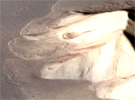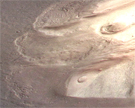I am a professor in the astronomy department who mostly studies theoretical approaches to
turbulent phenomena and the transition to conformational biophysical activity on extrasolar planets.
I study the physics of inertial particles in turbulent environments, such as planetesimals in protoplanetary
disks and droplet coalescence in turbulent clouds. The physics is surprisingly rich and unexplored.
I also work on developing a physically realistic procedure for treating mixing of chemical species in
turbulent astrophysical settings.
As a member of the VPL Lead Team of the National Astrobiology Institute (NAI), I work on the
photochemistry of oxygenated atmospheres of M star terrestrial-like or SuperEarth habitable zone
planets irradiated by frequent flares. I enjoy the possibility of a system so far from equilibrium that
it cannot easily be simulated.
I spend most of my time on a longer-term project that combines polymer physics with studies of
biological macromolecules to quantify the conditions for elementary conformational behavior loop
closure, folding, reversible denaturation-- as a prerequisite for the transition to biochemical activity.
I am a new collaborator with the Titan Prebiotic Chemistry Consortium, another NAI team. I will
work on the effects of cosmic rays on chemistry and polymerization on Titan-like worlds.
My main goal is to find whether the relatively weak thermal fluctuations on Titan are sufficient,
when coupled to noncovalent macromolecular interactions, to drive a biochemistry, as they do on
Earth; i.e. is Titan too cold for life? I am interested in astrobiological projects that can result in definite
answers to major questions without either extreme speculation or intensive molecular dynamics simulations.
The downside is the labor-intensive acquisition of interdisciplinary background. |





